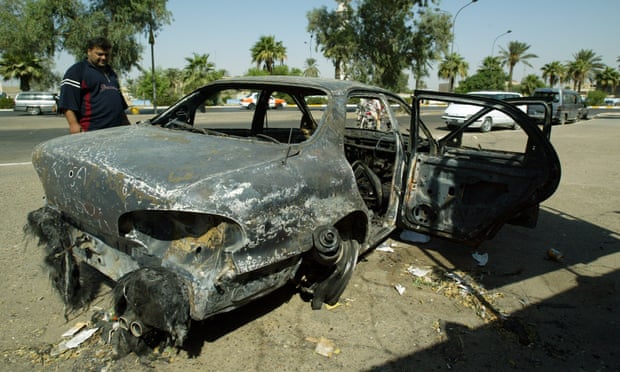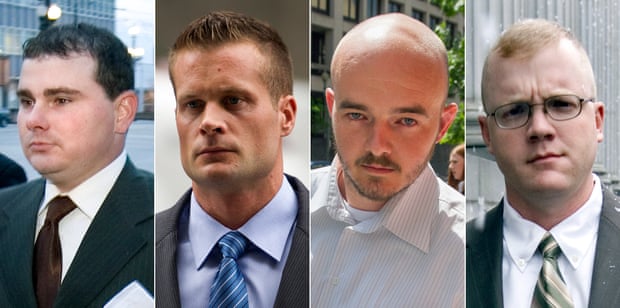Donald Trump has pardoned four security guards from the private military firm Blackwater who were serving jail sentences for killing 14 civilians including two children in Baghdad in 2007, a massacre that sparked an international outcry over the use of mercenaries in war.
The four guards – Paul Slough, Evan Liberty, Dustin Heard and Nicholas Slatten – were part of an armoured convoy that opened fire indiscriminately with machine-guns, grenade launchers and a sniper on a crowd of unarmed people in a square in the Iraqi capital.
The Nisour Square massacre was one of the lowest episodes of the US-led invasion and occupation of Iraq.
Slough, Liberty and Heard were convicted on multiple charges of voluntary and attempted manslaughter in 2014, while Slatten, who was the first to start shooting, was convicted of first-degree murder. Slattern was sentenced to life and the others to 30 yearsin prison each.
At the sentencing, the US attorney’s office said in a statement: “The sheer amount of unnecessary human loss and suffering attributable to the defendants’ criminal conduct on 16 September 2007 is staggering.”
After news of the pardon emerged on Tuesday night, Brian Heberlig, a lawyer for one of the four pardoned Blackwater defendants, said: “Paul Slough and his colleagues didn’t deserve to spend one minute in prison. I am overwhelmed with emotion at this fantastic news.”
The pardons are one of several the US president has granted to American service personnel and contractors accused or convicted of crimes against non-combatants and civilians in war zones. In November last year, he pardoned a former US army commando who was set to stand trial over the killing of a suspected Afghan bomb-maker, and a former army lieutenant convicted of murder for ordering his men to fire at three Afghans.
Prosecutors asserted the heavily armed Raven 23 Blackwater convoy launched an unprovoked attack using sniper fire, machine-guns and grenade launchers. Defence lawyers argued their clients returned fire after being ambushed by Iraqi insurgents.
The US government said in a memorandum filed after the sentencing: “None of the victims was an insurgent, or posed any threat to the Raven 23 convoy.” The memorandum also contained quotations from relatives of the dead, including Mohammad Kinani, whose nine-year-old son Ali was killed. “That day changed my life forever. That day destroyed me completely,” Kinani said.
Also quoted in the memorandum was David Boslego, a retired US army colonel, who said the massacre was “a grossly excessive use of force” and “grossly inappropriate for an entity whose only job was to provide personal protection to somebody in an armoured vehicle”.
Boslego also said the attack had “a negative effect on our mission, [an] adverse effect … It made our relationship with the Iraqis in general more strained.”
FBI investigators who visited the scene in the following days described it as the “My Lai massacre of Iraq” – a reference to the infamous slaughter of civilian villagers by US troops during the Vietnam war in which only one soldier was convicted.
After the convictions, Blackwater – which changed to Academi after being sold and renamed in 2011 – said it was “relieved that the justice system has completed its investigation into a tragedy that occurred at Nisour Square in 2007 and that any wrongdoing that was carried out has been addressed by our courts.
“The security industry has evolved drastically since those events, and under the direction of new ownership and leadership, Academi has invested heavily in compliance and ethics programmes, training for our employees, and preventative measures to strictly comply with all US and local government laws.”
The 14 victims killed by the Blackwater guards on trial were listed as Ahmed Haithem Ahmed Al Rubia’y, Mahassin Mohssen Kadhum Al-Khazali, Osama Fadhil Abbas, Ali Mohammed Hafedh Abdul Razzaq, Mohamed Abbas Mahmoud, Qasim Mohamed Abbas Mahmoud, Sa’adi Ali Abbas Alkarkh, Mushtaq Karim Abd Al-Razzaq, Ghaniyah Hassan Ali, Ibrahim Abid Ayash, Hamoud Sa’eed Abttan, Uday Ismail Ibrahiem, Mahdi Sahib Nasir and Ali Khalil Abdul Hussein.
Source (Click Here)



 RSS Feed
RSS Feed